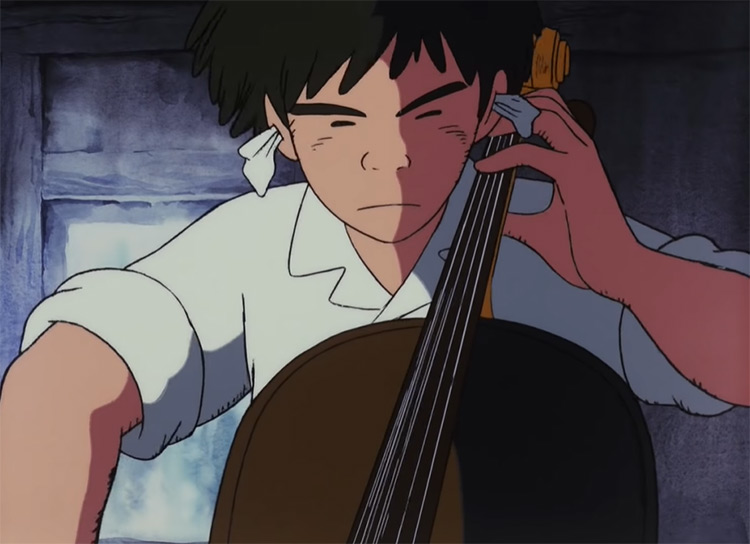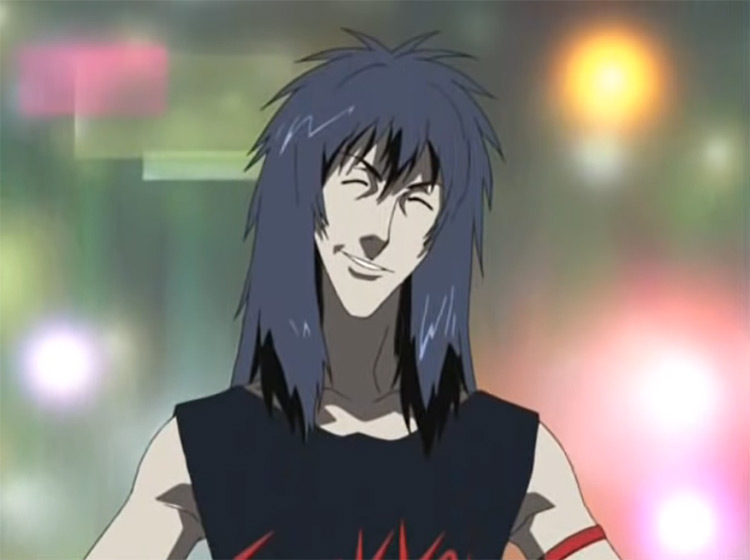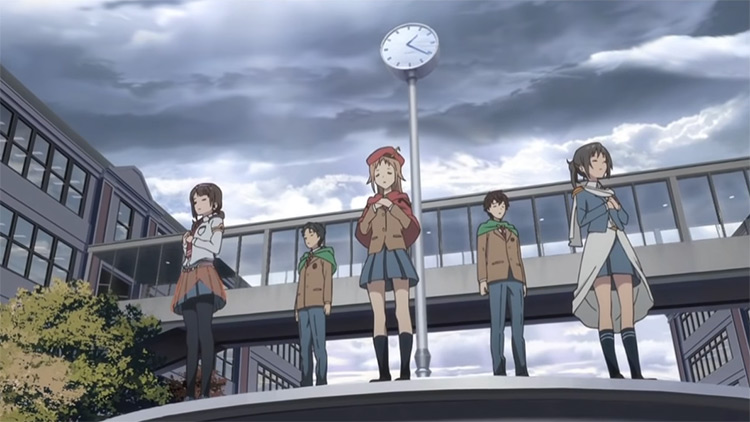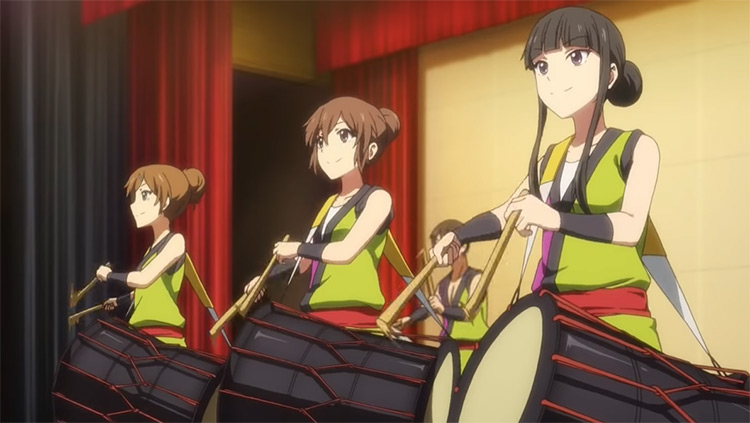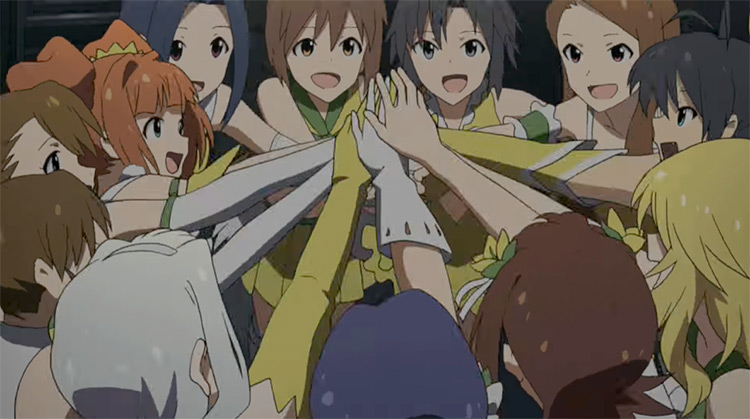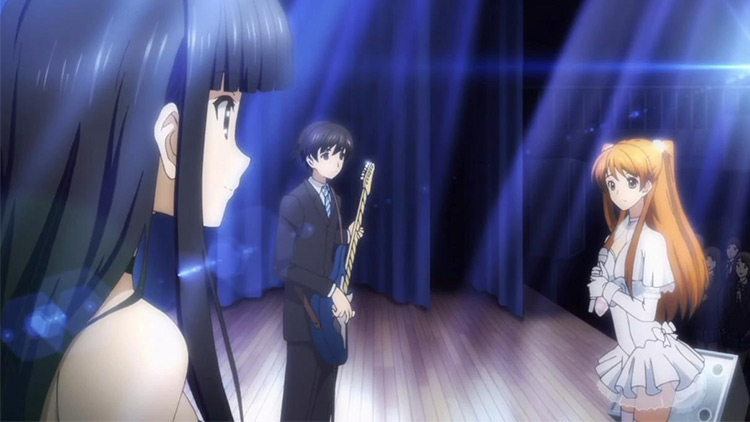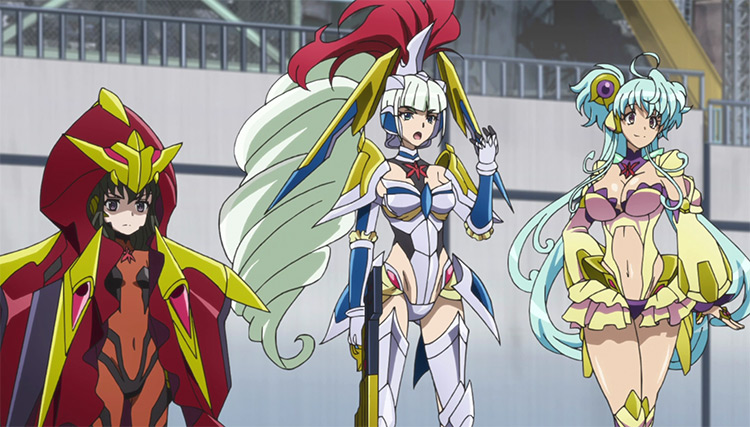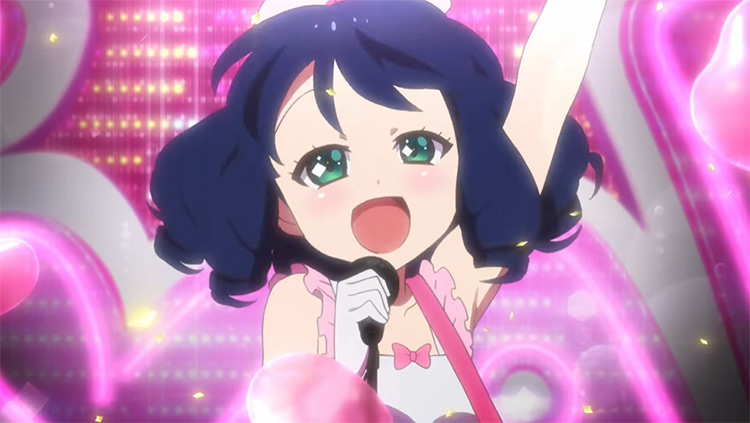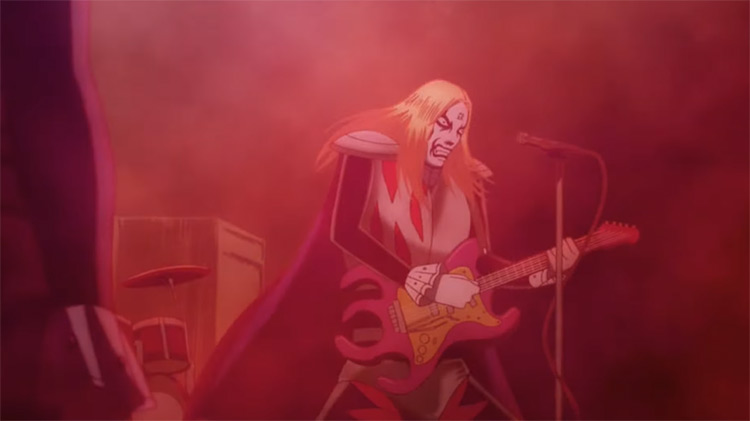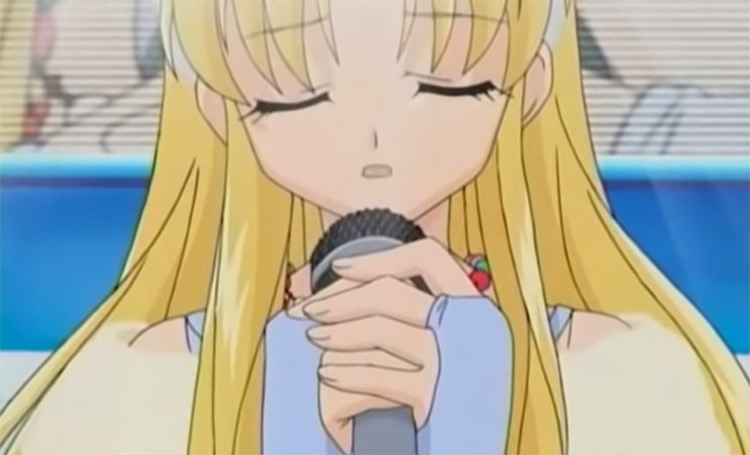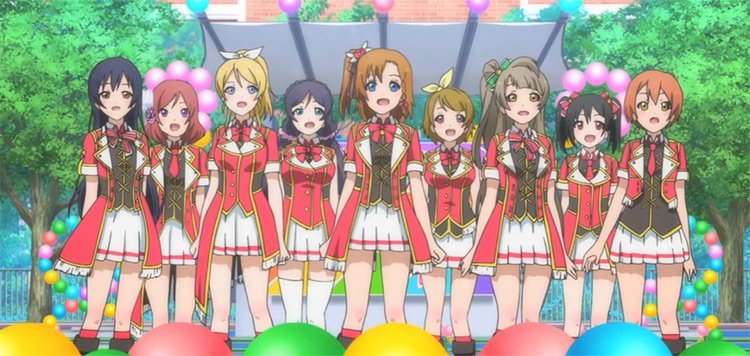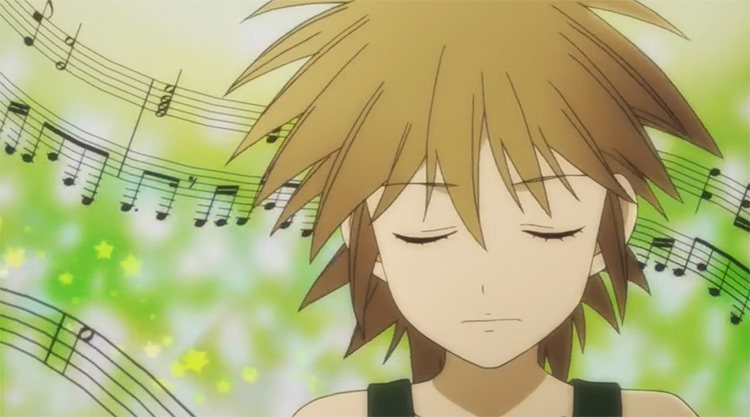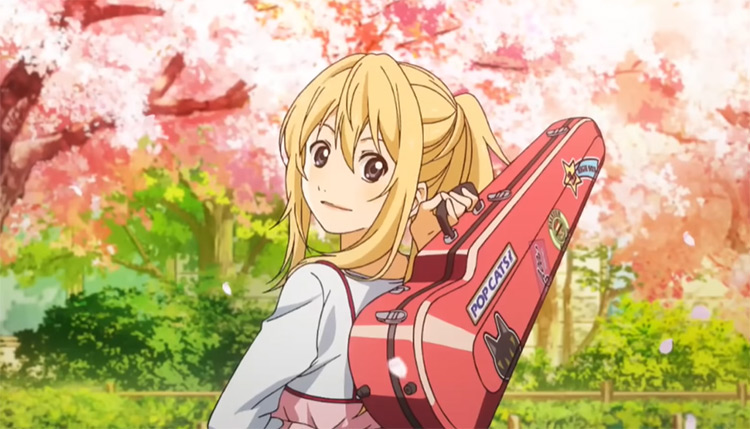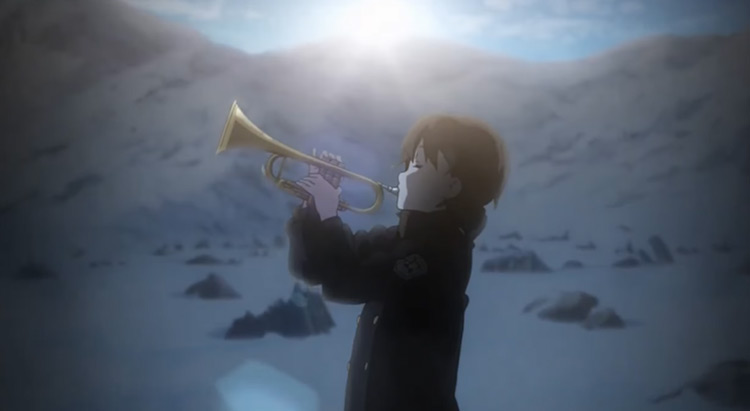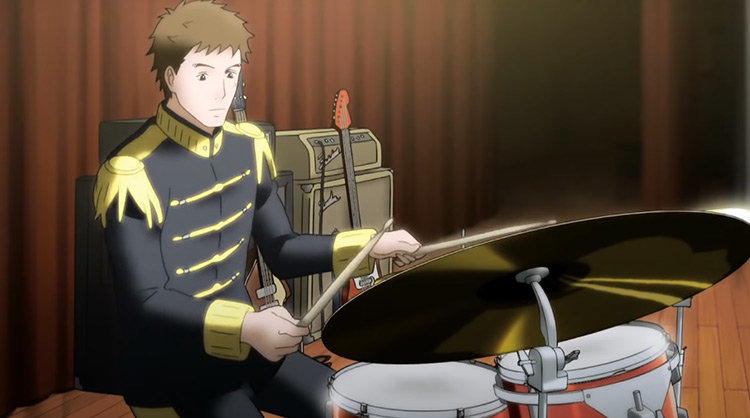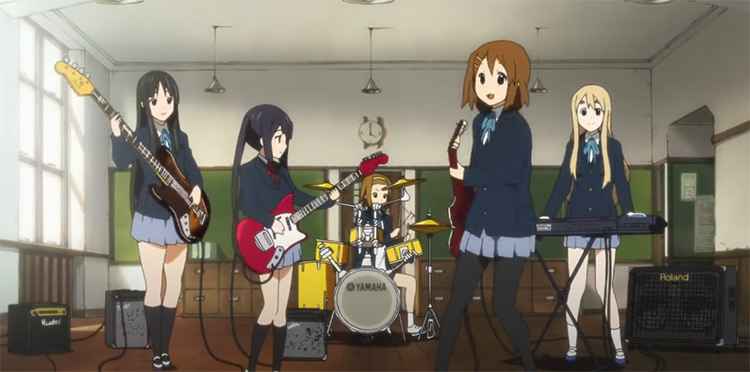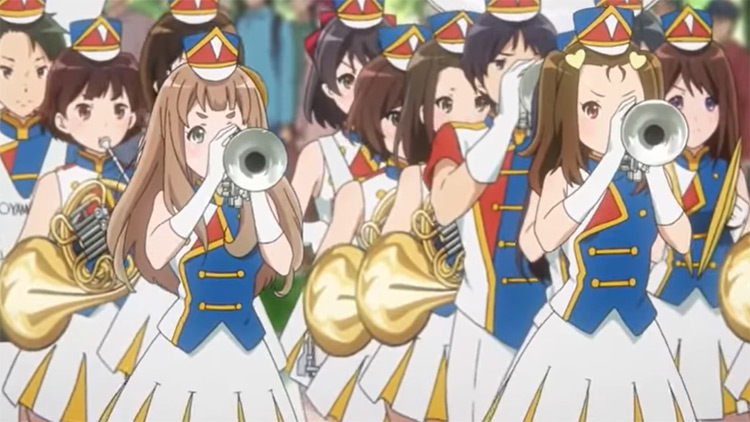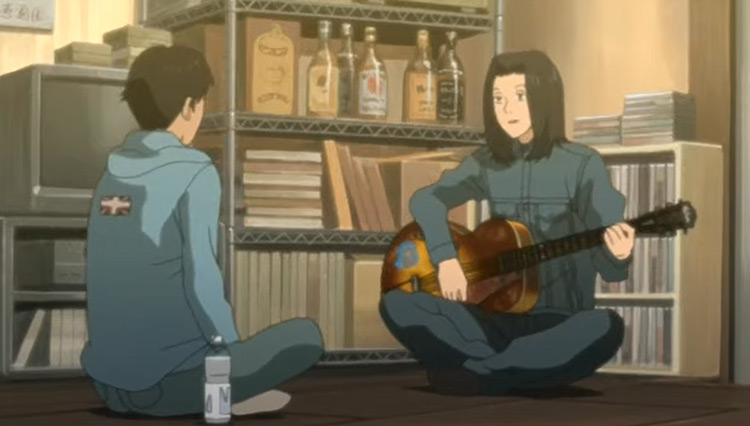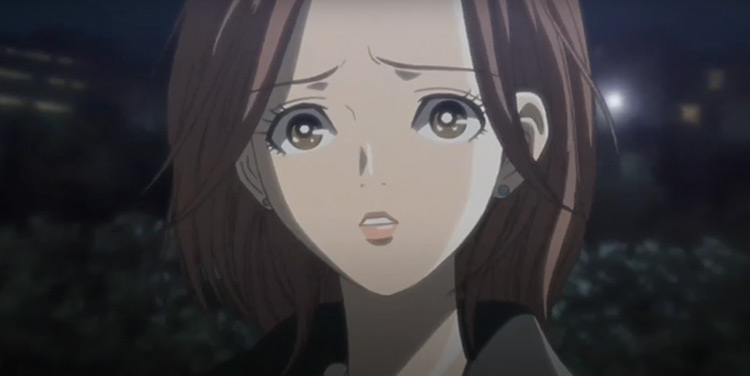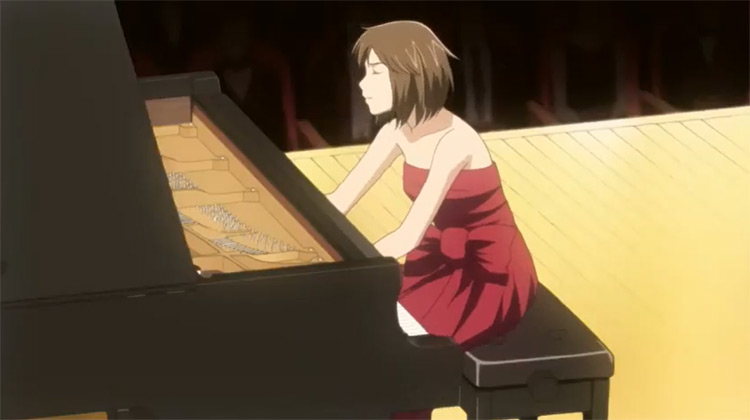But is there any good anime about music out there? It doesn’t have to solely be about it, but the music (and how interested the characters are) must play a significant role, so much so that the anime suffers without it. Thankfully, I have fond memories of many music anime. And it’s my pleasure to share some of the best with you. Warning: Some spoilers ahead.
20. Cello Hiki no Gauche (Gauche the Cellist)
Gauche the Cellist came out in 1982 — not even my older sister was born at that time. As such, you may think it’ll be a chore to watch this movie… but it’s surprisingly still charming. How often do you have a male cellist as the main character? And did I mention that this was produced by Studio Ghibli? The movie is basically a family-friendly tale about learning to appreciate not just classic music (and music in general), but the hard work and genuine passion necessary in playing music. Yes, Gauche learns various music appreciation lessons from animals such as a badger, mouse, and a cat. Gauche the Cellist was the recipient of the Ofuji Noburo Award at the 1981 Mainichi Film Awards. If you don’t trust my evaluation, the critics back then can at least vouch for this long-forgotten animated music film.
19. Kachou Ouji (Legend of Black Heaven)
This 13-episode series isn’t as old as Gauche the Cellist. But it’s still remarkably unknown since it came out in 1999. Legend of Black Heaven highlights the wonders of original anime series. Without a source material, you don’t know what to expect — and no one can spoil the fun (at least when it was still airing). So while it may seem like an amusing story of a family man and typical office worker reliving his past of being in a heavy metal band, it goes beyond that. One day, he’s showing off his guitar skills. The next day, a war beyond the scope of humanity becomes more catastrophic, all because he used his Gibson Flying V guitar. Rock and roll, Mr. Tanaka.
18. Tari Tari
PA Works has a knack for original anime starring a group of people who won’t give up until they reach their goals (or at least the dream of one member). Tari Tari is about Konatsu Miyamoto’s dream of performing at the last high school recital before she graduates. She didn’t do well the previous year, so the vice principal banned her for the next annual recital. This motivates her to form her own club, possibly with the help of her two friends, Wakana Sakai and Sawa Okita. But things don’t always work out as planned. To achieve her goal, she must prove her passion and skill. Tari Tari isn’t exclusively about the singing club and preparing for the recital. It does have original songs, but it shines most in its character development, using music to divulge the personal struggles of the eventual members. It’s a teenage drama laced with lovely music that works because it knows how to portray the struggles of its young cast, not making them look like overly emotional brats in puberty.
17. Aki no Kanade (Wakate Animator Ikusei Project)
This is a special anime, especially since it’s not a theatrical movie or a seasonal show. Aki no Kanade is one of the four short films made possible by the Japanese’s Agency of Cultural Affairs as part of Anime Mirai 2015. Thus, you don’t get anything more about Aki Miyagawa and her story other than this 25-episode film. But that’s enough for me to appreciate the film’s intentions and see how much Aki loves music, which has been a big thing in her life since childhood. In pretty much the same time you finish a regular anime episode, you learn about taiko drumming and all the people who pursue this art. Even if it’s not exactly a financially sound career path. Aki no Kanade is well-animated, looks good, and feels charming. Hopefully it inspires you to learn about other traditional instruments and musical performances in your own country.
16. The iDOLM@STER
Given its name, I was close to dismissing The Idolmaster as another generic idol show. Yet this feels more aware of its world — that it’s unafraid to critique the more questionable aspects of the idol industry. The girls here aren’t dreaming of becoming idols. They’re already idols. But they have problems getting more popular and earning enough. It feels a bit like how you achieve your dream, only to realize that you have to do more to sustain it. On the other hand, the girls here are allowed to talk about their work-related grievances and personal lives. But don’t think this is a prominently cynical anime: The Idolmaster has well-animated dance sequences and catchy original songs. Plus, its first half is light and fun. Enough to pull you in as it gets more serious in its themes. I’m not a huge fan of the rival talent agency (or at least its owner) being framed as this villain, but it shows the cutthroat world of idol groups.
15. White Album 2
You don’t have to see the first White Album because it’s not related at all. Also, I’ve seen this show two times already and I still feel deeply emotional during its final episodes. White Album 2 has a love trio starring Haruki Kitahara, Setsuna Ogiso, and Kazusa Touma. Everyone loves Setsuna, while Kazusa is the mysterious girl. It’s common for Kazusa to not attend class, and if she does, she’s probably just sleeping the entire time. But they all have a passion for music: Kazusa is a highly skilled pianist, Setsuna can sing (she loves karaoke), and Haruhi wants to improve his guitar skills. White Album 2 excellently weaves its original songs and the trio’s music sessions with young love to build drama that culminates in a satisfyingly painful way, if that makes sense.
14. Senki Zesshou Symphogear (Symphogear)
Music anime seems to be rich in original stories (although the first season had a 15-chapter manga) as my next entry is Symphogear, possibly the best cult anime franchise of the 2010s. I’m not kidding when I say it’s the anime of the decade for many people. Symphogear had five seasons, each improving in viewer score after the previous one — and it’s hard to see shows try what it did. This show is difficult to explain, but it involves kawaii girls who sing a wide range of songs (ranging from rock to the usual idol sound) to power ancient armors called Symphogear. The girls use their respective Symphogear to battle against an unknown race called the Noise. Also, the series involves national and international organizations. I guess it’s a mecha idol action anime… and that somehow works quite well, keeping me hyped with each grand unabashed performance.
13. Show By Rock!!
I never expected Studio Bones to produce something like Show by Rock. Still, this new frontier for them is a welcome surprise. I shouldn’t even like this show because of its heavy use of CGI animation. But it’s unashamed of its world: a world where music reigns supreme. I mean that in a literal sense. If you can perform amazing music, you can take control of Midi City, which is the place Cyan Hijirikawa gets sucked into after playing a rhythm game. Evil forces are planning to rule the city, but they won’t get away with it if Cyan teams up with Retoree, Chuchu, and Moa. This is a cute and vibrant show that definitely loves Japanese rock. If you’re okay with CGI, give this a try.
12. Detroit Metal City (Detroit Metal City: The Animated Series)
Detroit Metal City is a cult classic that I don’t see becoming a household, name simply because of some of its content. There’s a scene where a heavy metal icon is accepting some… services, while snakes are wrapped around his neck. And the MC Souichi Negishi has a few nasty scenes involving his drool. Not 100% for the kids out there. But this is a solid anime about music. Soichi loves his soft, charming indie music, but he ended up being the vocalist (and guitarist) of a death metal band upon his arrival in Tokyo. It’s insanely hilarious, but both the “sot indie music” and the death metal tracks (and even one hip-hop song) are top-notch.
11. Full Moon wo Sagashite (Searching for the Full Moon)
Released in the early 2000s with a total of 52 episodes, Searching for the Full Moon is an anime series that deserves more viewers. It’s about a young girl named Mitsuki Kouyama who promised her friend Eichi Sakurai (who moved to the United States) that she’ll become a singer while he becomes an astronomer. Here’s the catch: She has throat cancer. She can have surgery to remove her disease, but she will risk losing her voice. Worse, she only has a year to live. Thanks to two shinigami (thank you, the power of anime), she gets a chance to chase her dreams and realize just how much singing and music mean to her, and how lovely it is to truly feel alive. Searching for the Full Moon bravely delves into themes of suicide and death, but it never feels cynical. It’s a carefully crafted series, and its music, from the OP to the ED and the performances, all make Mitsuki’s journey eternally memorable.
10. Love Live! School Idol Project
This is the highest-ranking idol anime on my list. Who can even deny its impact in the anime community? Its characters such as Niko Yazawa and Kotori Minami constantly appear as memes and reaction faces on anime forums and social networks. But if you get out of the “Love Live is trash and so am I” conversations, you’ll find lots to love about the franchise. Did you know that people contributed to how the anime would look? People voted with their phones to choose who became the main girl of the music videos, what the girls’ characteristics would be, and what the group would be called. No wonder the fans are so passionate about them. And this is still ongoing as of this writing. As for the music: the quantity and quality are equally incredible. Watch not just the performances in the anime, but also the live concerts.
9. Piano no Mori (Forest of Piano)
A 12-episode adaptation of Piano no Mori from Studio Gaina exists… but I highly suggest watching the movie instead. I think the pacing works better on the film (done by Madhouse), and it honestly looks and sounds better. As the title implies, the focus here is the piano. And classical music in particular. The music itself is great, but Piano no Mori complements the performances with stunning visuals too. When Kai Ichinose plays the piano in the forest, it’s like magic. The lighting and animation are wondrous. You can sense how Kai is in a different world when he touches the keys and shares his hidden talent. But it’s not just about Shuuhei and Kai’s friendship (and friendly rivalry). Takako Maruyama has an amazing piano performance at the end — and it involves her dog, Wendy.
8. Shigatsu wa Kimi no Uso (Your Lie in April)
Viewers knew Your Lie in April was something special during its run. Every week, I’d see posts on forums praising its performance animation. I was delighted when I finally saw the series. One YouTube video of the infectious opening song has over 30 million, views while the live performance by Goose house (who did the song) has 45 million views as of writing. From the get-go, Your Lie in April pulls you in with Kousei and Kaori (and Tsubaki and Ryouta as well). Kousei has lingering issues with the death of his mom. So much so that he has trouble playing the piano. On the other hand, Kaori has something (or rather, a lot of things) she has yet to reveal to Kousei. The animation, art style, cinematography, and music are consistently excellent. It’s an emotional series, but you won’t regret having witnessed their story and their love for music.
7. So Ra No Wo To (Sound of the Sky)
Sound of the Sky is close to being a masterpiece. Set in the town of Seize, it shows people going through their lives while conflict looms between their nation Helvetia and the Roman Empire. Here, you meet the young Kanata Sorami. She just entered the military. But her role isn’t to fight on the battlefield — what she wants is to master playing the bugle, an instrument used for marching orders, giving instructions, and assembling military leaders. There’s something bittersweet about the series. And you can sense it not just from the facial expressions of the characters, but also the music and how the town looks. When Kanata and the rest perform classical and beloved songs (including “Amazing Grace”), I’m not sure if it’s heartwarming or heartbreaking — or both. The more you witness the large-scale conflict, the more the songs feel heavier and valuable to those in Seize. Sound of the Sky is a testament to the optimistic nature of humanity. A reminder to appreciate beauty in a world, even though it may be on the brink of utter desolation.
6. Sakamichi no Apollon (Kids on the Slope)
Shinichiro Watanabe is responsible for the critically acclaimed Cowboy Bebop and Samurai Champloo. And he also directed this incredible anime, Kids on the Slope. The series is set in 1966 when teenager Kaoru Nishimi goes to Kyushu because of his dad’s work. He’s a timid guy — until the straightforward Sentarou Kawabuchi approaches him. People think Sentarou is a bad guy due to his appearance, but he’s really someone who loves the drums and jazz music in general. Kaoru knows classical music and how to play the piano. So they begin their journey of discovering and the rich world of jazz music. It’s a wonderful coming-of-age tale that has realistic main characters, gorgeous backgrounds, a perfect ending, and a stunning jazz score from Yoko Kanno herself.
5. K-On!
I know, you can argue that K-On! isn’t even about music. You could say it’s all about doing nothing, looking at a turtle, and having tea and cake in the afternoon. Yet K-On! wouldn’t be the slice-of-life masterpiece it is without music. Remember the beginning: Yui was a freshman who just wanted to join a club. She saw the Light Music Club but decided not to join because she didn’t know how to play the guitar, bass, drums, or keys. Without her, the Light Music Club would be disbanded. So what happened? Ritsu, Mio, and Tsumugi (and the latter two weren’t even really planning to join as well) decided to play music just for Yui — and she fell in love with their performance, so much that she joins the club. That’s the power of music that K-On! exemplifies without going outside its comfy, soothing vibe. Even if the girls like joking around and teasing Mio all the time, they genuinely love playing music. More importantly, they enjoy playing music together. The moments they spend practicing and performing music in the club room are priceless. But they can’t do them forever. Soon, they’ll graduate and have different career paths and responsibilities. And music may no longer be their passion. My favorite K-On! scene is from the 24th episode of Season 2, where Azusa tearfully asks them not to graduate, leaving her and the Light Music Club behind. In response, the girls perform a song for her — one specifically written for her. Everything in that scene is perfect. And that alone justifies why K-On! is an anime about music (and how it changes people’s lives).
4. Hibike! Euphonium (Sound! Euphonium)
Yes, K-On was beaten by another series from the same studio. If K-On leans more on slice-of-life and comfy humor, Sound! Euphonium adds more instruments, training, and drama. This anime has everything going for it: From its insanely well-animated opening to its orchestral music and well-designed characters (and it has a lot), Sound! Euphonium is a testament to the brilliance of Kyoto Animation. The series follows Kumiko Oumae as she enters Kitauji High and joins the school brass band. Eventually, the band sets out a goal to compete at the national competition. It’s a daunting task that the school has never achieved before. But Kumiko, her bandmates, and the new band advisor Noboru Taki are ready to take on the challenge. But like all great stories, this is not a smooth journey. Noboru Taki is generally a kind and polite man. Yet he becomes strict and rigorous when he’s dealing with the band, but he’s not evil. He just wants the youngsters to understand the work required to get closer to their goal. There are other sources of minor and major conflict in the series, but they all serve a purpose. It can be to develop a character or foster relationships among bandmates. After all, these people aren’t robots. They have feelings and experiences that affect how they play music, especially with certain people. Hibike! Euphonium is packed with stunningly animated and emotional scenes. And with the newest trailer I got to check out, expect to see more soon.
3. Beck (Beck: Mongolian Chop Squad)
The first thing I should tell you is that this has an eccentric-looking dog named Beck. Second, it features a song from The Pillows, a real alternative rock band from Japan. So yes, the dog and the band the 14-year-old MC Yukio joins are both called Beck. But why is this the bronze medalist on my list? I just love the adolescent journey of Yukio — and the songs are genuinely great, even if they perform the same songs. Do you remember when you first attended a small gig? Beck reminded me of the distinct sights, sounds, and even smell of witnessing local bands perform in a cramped venue. The people feel real. As if a camera is simply following them around. Slowly but surely, you become attached to the other band members too. Some will say it’s slow. But I think Yukio develops just at an adequate pace. Once he grows out of his shell, it feels like seeing your own child leave home for university. Give the OP a listen. It’s on YouTube. If you find yourself tapping your feet and dancing a bit, you’ll likely love Beck as well.
2. Nana
Before Hunter x Hunter and One Punch Man (the titles people associated most with Madhouse) there was Nana. This 47-episode series from 2006 is meant for young adults. You can watch it at any point in your life, but the struggles of the two Nanas (the main characters have the same name) all become too real if you’re in your 20s, or even early 30s. Nana Komatsu just arrived in Tokyo to be with her boyfriend. On a train, she spots the punk rocker, Nana Osaki. Through a series of events, the two Nanas end up living in the same apartment. It’s difficult to state how realistic Nana feels at some points. Yes, it’s a shoujo with shoujo elements from its character design to its mix of humor and romance. However, it’s also unafraid to dig into aspects of life such as lies, jealousy, abuse, drugs, and the lonely stressful journey to adulthood. Nana uses its rock music as an emotional release of its characters, just like how real artists do. So the vocals, lyrics, and instrumentation pack emotional weight, giving viewers a way to better understand the complex situations they’re in. Sometimes, only music can fully capture what you’re going through. And that’s why everyone, including you and I, find personal connection and comfort in music written by complete strangers. Some who may not even be alive anymore. But again, that’s the power of music. And Nana knows how much it can elevate its story.
1. Nodame Cantabile
Nodame Cantabile should be considered a modern classic, with its original digital copies and illustrated frames kept in a museum or at an archival institution. If you love music and appreciate how music shapes the entire course of one’s life, you have to watch this show. It focuses on Megumi Noda (a pianist) and Shinichi Chiaki (a conductor), but it also has a wide variety of supporting characters with their own goals in life, all of which also deal with music. Since it has three seasons and one OVA, Nodame Cantabile has enough time to let characters mature and take different paths. From being university students, Megumi and Shinichi travel overseas to further hone their music skills and make connections with legendary figures in the industry. It’s not a smooth ride. Things like competition, success, pressure, admiration, love, and even aging will affect the cast in different ways. Relationships change, just as the people themselves change. Nodame Cantabile celebrates the love for classical music, and the love between people who dedicate their lives to music. It’s a rich, heartwarming, and inspiring story that will stand the test of time.
